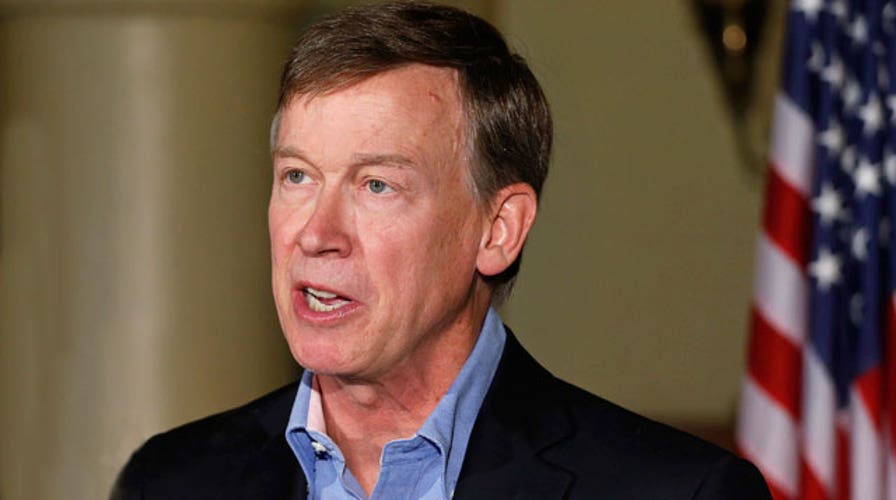Colorado gun laws hurt Hickenlooper re-election bid
Bradley Blakeman and Chuck Rocha on the governor's re-election chances against former GOP congressman Bob Beauprez
Colorado Gov. John Hickenlooper is in a fight for a second term that’s turning out far tighter than anyone would have expected, with recent polls showing him virtually tied with Republican challenger Bob Beauprez.
His challenger’s strong base of conservative support is proving problematic for the Democratic incumbent.
Floyd Ciruli, a Colorado pollster and political analyst, noted that Colorado governors typically get re-elected, and “John Hickenlooper really looked strong about a year and a half ago."
But the outcome of this year’s Republican primary, as well as public pushback over the governor's support for gun control laws and other decisions in office, are creating the perfect political storm.
"There's a lot of dissatisfaction with the current state of affairs with John Hickenlooper," Beauprez said.
Several requests by Fox News for an interview with Hickenlooper went unanswered.
The former Denver mayor easily won his first race for governor against a Republican Tea Party candidate with little support and third-party candidate Tom Tancredo. However, he now faces a much stiffer challenge from Beauprez, considered an establishment Republican.
"The Republicans for the first time in almost a decade managed to get through a primary with a strong candidate," Ciruli said. "And they have united behind that candidate very quickly."
That's not to say Hickenlooper hasn't had successes. His handling of the state's response to several devastating wildfires in recent years and the unprecedented massive flooding that hit northern Colorado last fall received high marks from those involved.
He also earned praise in preparing for the nation's first legal recreational marijuana sales, which began in January, though Hickenlooper had campaigned against the amendment that voters passed. As the governor noted in this year's State of the State, "This will be one of the great social experiments of this century. And while not all of us chose it, being first means we all share a responsibility to do it properly."
Hickenlooper's handling of other controversial issues, though, has contributed to his approval ratings falling from a high of 66 percent to under 50 percent.
"People's constitutional rights, their liberty," Beaupreaz charged, "is being trampled over and over again at the state level."
One of the biggest turning points in Hickenlooper's popularity came in 2013 when Colorado's Democratic-controlled legislature passed what was then reported to be the strictest gun control measures in the country.
As the governor pointed out recently, the measures were a response to the mass shooting carried out by James Holmes in an Aurora movie theater the year before. "We didn't want any family going through what they already had to go through," he said.
The reaction from gun rights supporters was swift. For the first time in state history, two senators, including the Senate majority leader, were voted out in recall elections.
The governor's decision on whether death row inmate Nathan Dunlap's execution should be carried out as scheduled last fall also made almost no one happy when he announced a temporary reprieve for the prisoner.
Explaining that he had changed his mind on the death penalty and no longer supported it, Hickenlooper said Dunlap, who gunned down four people in a Chuck E. Cheese restaurant in 1994, could still be executed by a future governor but not while he was still in office.
"I'm not sure why he took the job if he was unwilling to make the tough decisions," Beauprez said. "Whether you happen to be pro or anti-death penalty he knew this decision was coming and he made neither one. On my watch justice will be served, Nathan Dunlap will be executed."
Hickenlooper may have successfully dodged another bitterly divisive issue, though, with his recent agreement with Democratic Rep. Jared Polis to pull support for anti-fracking measures on the November ballot.
As in many western states, energy production is a major issue in Colorado. Polis personally poured millions of his own dollars into November ballot initiatives that could have essentially shut down oil and gas fracking in much of the state.
Hickenlooper, a former geologist who believes fracking is safe, convinced Polis to withdraw his support for the measures. "This is how we do things in Colorado," he announced. "We have all the interests at the table and you work through the differences and difficulties."
In return, Hickenlooper will create a commission to study the issue and make recommendations. The agreement dilutes criticism the governor has faced on the issue from both sides of the aisle.
Whether Hickenlooper wins in November has ramifications beyond Colorado. In the last seven years, there has been a monumental shift in the political affiliation of governors in the American West. Leaving out the West Coast, which is its own political animal, looking at the other 14 states in the region, half had Democratic chief executives in 2007.
Today, only two are left: Hickenlooper and Montana Gov. Steve Bullock. If Hickenlooper loses in November, Bullock will be the lone Democratic governor left standing between California and Missouri.





